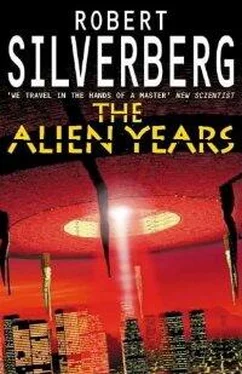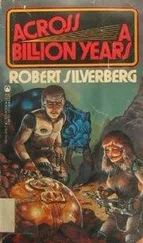Robert Silverberg - The Alien Years
Здесь есть возможность читать онлайн «Robert Silverberg - The Alien Years» весь текст электронной книги совершенно бесплатно (целиком полную версию без сокращений). В некоторых случаях можно слушать аудио, скачать через торрент в формате fb2 и присутствует краткое содержание. Год выпуска: 1998, ISBN: 1998, Издательство: HarperCollins, Жанр: Фантастика и фэнтези, на английском языке. Описание произведения, (предисловие) а так же отзывы посетителей доступны на портале библиотеки ЛибКат.
- Название:The Alien Years
- Автор:
- Издательство:HarperCollins
- Жанр:
- Год:1998
- ISBN:0-246-13722-3
- Рейтинг книги:5 / 5. Голосов: 1
-
Избранное:Добавить в избранное
- Отзывы:
-
Ваша оценка:
- 100
- 1
- 2
- 3
- 4
- 5
The Alien Years: краткое содержание, описание и аннотация
Предлагаем к чтению аннотацию, описание, краткое содержание или предисловие (зависит от того, что написал сам автор книги «The Alien Years»). Если вы не нашли необходимую информацию о книге — напишите в комментариях, мы постараемся отыскать её.
The Alien Years — читать онлайн бесплатно полную книгу (весь текст) целиком
Ниже представлен текст книги, разбитый по страницам. Система сохранения места последней прочитанной страницы, позволяет с удобством читать онлайн бесплатно книгу «The Alien Years», без необходимости каждый раз заново искать на чём Вы остановились. Поставьте закладку, и сможете в любой момент перейти на страницу, на которой закончили чтение.
Интервал:
Закладка:
Steve hurried down the hall. In the library, a dark low-roofed room with floor-to-ceiling shelves crammed with hundreds and hundreds of rare and learned books on various Oriental cultures that had belonged to the Colonel and had not been looked at by anyone in fifteen or twenty years, a most unscholarly tableau was on display. Frank was leaning casually against a bookcase to the left of the door, with the shotgun that everyone carried when going up to the gate resting lightly across his left forearm. It was pointing in the general direction of a tense, scowling, heavyset man in loose-fitting denim trousers and a plaid flannel shirt on the other side of the room. An angry-looking stranger, whom Steve recognized, after a moment, as his son Andy.
“We probably don’t need to hold him at gunpoint, Frank. Do we, Andy?”
“He seems to think so,” Andy said balefully.
“Well, I don’t. Is that all right with you, Frank?”
“Whatever you say, sir. Do you want me to leave the room?”
“Yes. I think I do. Don’t go very far, though.”
As Frank went out, Steve looked toward Andy and said, “Am I safe with you?”
“Don’t talk crap, Dad.”
“I can’t be sure. You’re a strange one, you are. Always were, always will be.” Andy had put on more than a little weight, Steve noticed. And his hair was beginning to recede. The Gannett genes rising up in him. How old was he, anyway? Steve had to count it up. Twenty-four, he decided. Yes. Twenty-four. He looked considerably older than that, but then Steve reminded himself that Andy had always had looked older than his years, even when he was only a little boy. “A strange one, yes, indeed, that’s you. Anson said he thought you were a mutant.”
“He did? Look, Dad. Five fingers on each hand. Only one head. Only two eyes, on different sides of my nose, the way they’re supposed to be.”
Steve was only faintly amused. “Nevertheless,” he said, “a mutant. A mutant personality, is what Anson meant. Someone who’s not at all like any of us.—Here, look at it this way: I’m a nerdy sort of guy, Andy. Fat and slow and cautious. Always have been, always will be. I don’t mind being like that. But I’m also a decent and responsible and hardworking citizen. So tell me this: How did I raise a criminal like you?”
“A criminal? Is that what I am?”
“Too harsh a word, is it? I don’t think so. Not from the things I’ve heard. Why did you come back here, Andy?”
“I’m not sure. A touch of homesickness, maybe? I can’t say. I was on my way to Frisco and suddenly something came over me and I thought, Well, what the hell, I’m driving up that way anyway, I think I’ll go to the dear old ranch, I’ll see the folks again, good old Mom and Dad, good old tight-assed Anson, good old red-hot La-La.”
“La-La, yes. She prefers to be called Lorraine now. That’s her real name, you may remember. She’ll be glad to see you. She can introduce you to your son.”
“My son.” Not a flicker of animation appeared on his chilly face.
Steve smiled. “Your son, yes. He’s five years old. Born not too long after you skipped out of here.”
“And what’s his name, Dad? Anson?”
“Well, actually, you’ll be surprised to learn that it is. Anson Carmichael Gannett, Junior. Wasn’t that sweet of Lorraine, naming him after you, all things considered?”
It was Andy’s turn not to seem amused. He gave Steve a long, steady, sullen look. In an absolutely flat, cold voice he said, “Well, well, well. Anson C. Gannett, Junior. That’s very nice. I’m terribly, terribly flattered.”
Steve chose to take no notice of Andy’s mocking tone. Smiling still, he said, “I’m glad to hear it. He’s a really lovely child. We call him ‘Anse.’—And just how long are you planning to stay with us, son, now that you’re here?”
“As least as long as Frank is sitting out there in the hall with his shotgun, I guess.”
“I’m sorry about the gun. Frank overreacted a little, I think. But he didn’t know what to expect from you. We know that you’ve been living on the edge of the law ever since you left here. Working as a pardoner, right?”
Stiffly Andy said, “The laws that pardoners break are Entity laws. The things that pardoners do save people from Entity oppression. I could make out a case for looking upon pardoner activity as being one aspect of the Resistance. A kind of freelance Resistance effort. Which would make me just as decent and law-abiding a citizen as you claim to be.”
“I understand what you’re saying, Andy. Even so, the fact remains that pardoners live a kind of shady underground existence and not all of them are completely honest. I like to think that you were more honest than most, though.”
“As a matter of fact, I was.” There was a crackle in Andy’s voice and a glint in his eye that led Steve to think that he might actually be telling the truth, for a change. “I wrote a few stiffs, yes—you know what those are?—but only because the pardoner guild told me I had to. Guild rules. Most of the time I played it straight and did the job right. A matter of professional pride as a hacker. I got to know the Entity net inside and out, too.”
“That’s good to know. We rather hoped you had. That’s why we’ve been looking all over for you, all these years.”
“Have you, now? What for?”
“Because we’re still running the Resistance up here, and you have unique skills that could be of service to us in a major enterprise that we’ve been working on for a long time.”
“And what kind of enterprise might that be? Let’s get down to it, all right? Just what do you want from me, Dad?”
“To begin with, your cooperation on a little hacking project of critical importance, one that happens to be too tough even for me, but which I think you can handle.”
“And if I don’t cooperate?”
“You will,” Steve said.
Andy was astonished. The Borgmann archive! Well, well, well.
He remembered having gone looking for it once or twice or thrice—when he was fourteen, fifteen, somewhere back there. Everyone did. It was like looking for El Dorado, King Solomon’s mines, the pot of gold at the end of the rainbow. The legendary Borgmann data cache, the key to all the Entity mysteries. — But the quest had brought no payoff for him, and he had lost interest quickly enough, once it started petering out into useless trails. You went sniffing up this promising pathway and that one, and for a time you were sure that you actually had found the way to reach the goodies that the sly and malevolent Borgmann had stashed away for his own private amusement in some unspecified zone of memory in somebody’s computer somewhere on Earth. And then just as you were pounding down the road to success and had worked up a really good sweat you discovered that you had been turned around without noticing it and were disappearing up your own anal orifice, so to speak, and the ghostly cackle of Borgmann’s laughter was resounding in your ears. Andy had decided, after a few such experiences, that there were better things in life for him to be doing.
He told all that to Steve and Anson, and to Frank, who had accompanied them on the way over to the communications center. Despite his tender years, Frank seemed to have become very important here during Andy’s absence.
“We want you to give it another try,” said Anson.
“What makes you think I’m going to get anywhere now?”
“Because,” said Steve, “I’ve got a data path here that I don’t think anybody’s ever traveled up before, not very far, anyway, and I’m convinced it leads right to Borgmann. I’ve known about it for years. I fool with it, every once in a while. But there’s a lock across it that I can’t get through. Perhaps you can.”
Читать дальшеИнтервал:
Закладка:
Похожие книги на «The Alien Years»
Представляем Вашему вниманию похожие книги на «The Alien Years» списком для выбора. Мы отобрали схожую по названию и смыслу литературу в надежде предоставить читателям больше вариантов отыскать новые, интересные, ещё непрочитанные произведения.
Обсуждение, отзывы о книге «The Alien Years» и просто собственные мнения читателей. Оставьте ваши комментарии, напишите, что Вы думаете о произведении, его смысле или главных героях. Укажите что конкретно понравилось, а что нет, и почему Вы так считаете.












